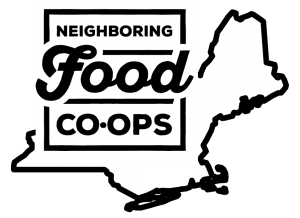 Your Neighboring Food Co-ops
Your Neighboring Food Co-ops
Locally Owned by More Than
160,000 People Like You!
In this Month’s E-News:
- Co-ops Build Back for Impact!
- Back to (Co-op) School
- Co-op Jobs
- Cooperative Fund of New England
- September’s Cave to Co-op Special
- Farmers Union: Support Competition in Processing
- Co-op Calendar
Celebrated by co-operatives nationwide during the month of October, National Co-op Month is an annual opportunity to raise awareness of a trusted, proven way to do business and build our communities.
Under the theme “Build Back for Impact,” the National Cooperative Business Association, CLUSA International, invites co-ops and credit unions to leverage our shared Co-operative Identity in the face of some of the biggest challenges we face: a global pandemic, climate emergency, systemic racism, and economic inequality. As we build back an economy that works for everyone, our greatest impact comes from embracing the values and principles that make us truly unique.
International, invites co-ops and credit unions to leverage our shared Co-operative Identity in the face of some of the biggest challenges we face: a global pandemic, climate emergency, systemic racism, and economic inequality. As we build back an economy that works for everyone, our greatest impact comes from embracing the values and principles that make us truly unique.
Working together to communicate the co-operative difference is central to the work of the Neighboring Food Co-op Association (NFCA), a federation of over 40 food co-ops and start-up initiatives, locally owned by more than 164,000 people across New England and New York State and generating over $382 million in shared revenue. Over the past year, our member co-ops have been working to support one another, share innovations and ideas, and strengthen our communities at a challenging time. And as we look forward, we know that we can rebuild better, contributing to more resilient communities, a more just and sustainable food system, and a more inclusive economy.
The collective impact of our member co-ops continued to grow during the pandemic, with overall sales increasing 10% during 2020, a year full of supply disruptions and unanticipated implementation of new programs to keep our communities safe during such as online shopping, new safety protocols, and mutual aid programs. Our co-ops also expanded their impact on local economies, adding over 100 new staff and growing their sales of local products to over $100 million, sustaining good jobs and increasing our support of farmers and businesses across the Northeast. At the same time, we continued to work to make healthy food and co-operative membership more accessible to everyone, with many co-ops expanding their offerings of lower cost and conventional products. At a time of growing food insecurity, our co-ops redoubled their efforts to address affordability, distributing more than $845,000 in additional discounts on groceries to people with limited incomes. In 2020, nearly 13,000 people joined their local food co-ops, reflecting growing interest in building community and supporting one another during challenging times.
Monadnock Food Co-op in Keene, NH, which opened its doors less than ten years ago, completed an expansion project during the first stages of the pandemic, enabling the co-op to better serve its members and shoppers, support more local producers, and hire more staff. The 6,700 square-foot expansion to their building enabled the co-op to provide a greater assortment of fresh and healthy product choices, improved pricing through stronger purchasing power, the creation of two new community spaces, and growth in sales of local products to $6 million annually, supporting more farmers and producers.
Through the economic downturn, Springfield Food Co-op in Vermont continued planning its move to a new location closer to their town center on Main Street and in June of 2021 they opened their new, larger store. The expansion included a sit-down cafe, a wider variety of products, and better workspaces for their staff, enabling the co-op to meet the needs of even more people and support more producers in the greater Springfield area.
In July, River Valley Co-op in Northampton, MA, opened its second location in Easthampton. This ambitious 23,000 square foot project included expanded parking, renewable energy installations, and opportunities to work with local worker co-ops. For example, PVSquared installed photovoltaic panels that also provide a shaded parking area, while Oxbow Design Build provided interior design work. As a result of the expansion, the co-op was able to add 80 new staff with more new co-op jobs to come, and have increased their impact for local producers. On opening day, River Valley Co-op offered shoppers the opportunity to round up their purchases, donating their change to a special solidarity fund supporting membership for people on limited incomes.
Also in Massachusetts, Franklin Community Co-op in Greenfield has been building on its successful expansion to a second location, McCusker’s Co-op Market in the village of Shelburne Falls, by exploring potential collaboration on a third satellite location. This project, still in discussion, would represent a unique collaboration between a food co-op and a local producer to operate a farm market, together. If it goes forward, this effort would represent a unique approach to partnering local farmers but an opportunity to serve more shoppers throughout the county.
Meanwhile, in the eastern part of the state, two of the NFCA’s member startups are organizing to open their doors in 2022. Dorchester Food Co-op, located in Boston’s largest neighborhood, and also one of the most racially and economically diverse, has secured a location and is actively seeking a general manager for their new food co-op. The NFCA helped Dorchester incorporate as a multistakeholder co-op, with consumers and workers as members, and has been providing them with development and mentorship support ever since. As part of our effort to support innovative new startups, the NFCA has made an initial investment in their capital campaign and invites Massachusetts residents and organizations to learn more about this opportunity by visiting their website.
In addition, Food Co-op Initiative has been a key NFCA partner in supporting the organizing progress at Assabet Co-op Market in Maynard, MA. This startup has hired a general manager and secured a location with approximately 6,000-square-feet of retail space for their new grocery store, co-operatively owned by over 1,700 members. Their new general manager, Sam McCormick, has been an active part of NFCA’s peer calls and dialogs, learning from other co-ops in the region while sharing their own experience as the former general manager of the Mariposa Co-op in Philadelphia, and reinforcing the value that collaboration brings to our member co-ops as they innovate and grow.
The past year has been a challenging one for all of us. But if we have learned anything, it is that our lives are better when we work together. Our shared co-operative values of equality, equity, solidarity, social responsibility, and caring for others came through in how our co-ops were able to adapt and respond to meet their community’s changing needs. In all our efforts, the NFCA has worked to leverage the Co-operative Identity and the experience, innovation, and resources of our member co-ops to support shared success, including peer support and collaboration for new managers, strategies for helping to build more inclusive co-ops, and best practices for startups. The growth of co-operation across the Northeast represents a renewed optimism at a challenging time – and an opportunity for us to work together to help one another improve our lives, strengthen our communities, and build back for impact.
Register now for a new course being launched in collaboration with NCBA CLUSA’s Co-operative IMPACT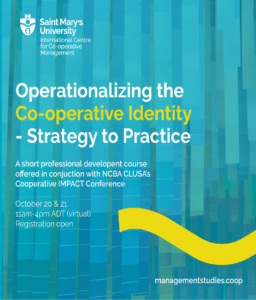 Conference in October!
Conference in October!
Join us for this engaging online course on Operationalizing the Co-operative Identity – Strategy to Practice. Designed for seasoned decision-makers and emerging leaders from any sector or type of co-operative, all will benefit from this knowledge-rich course. This participatory education experience focuses on enhancing your knowledge and building your network. Discuss and debate the many facets of the co-operative identity including how purpose, values, and principles translate into enterprise strategy and effective practice. The course participants and content will span governance, management, and operations perspectives.
Objectives
- Deepen your understanding of the links between your values-based enterprise model and the International Co-operative Alliances’ (ICA) Statement of Co-operative Identity.
- Finish the course with a rich set of concepts, tools, and examples, plus more knowledge of the diversity of the co-operative model in practice.
- Expand your co-operative network.
Course Facilitators
- Karen Miner, Managing Director of the International Centre for Co-operative Management, researcher and instructor.
- Dr. Sonja Novkovic, Co-operative Economist, Academic Director of the International Centre for Co-operative Management, Chair of the International Co-operative Alliance Committee on Co-operative Research, researcher and professor.
- Key presentations by Erbin Crowell (Master’s graduate, Executive Director of the Neighboring Food Co-op Association, Board Member of the National Co-operative Business Association) & Fred Freundlich (LANKI, University of Mondragon).
Dates and Format
- October 20 and 21, 2021, 10am-3pm EDT
- Offered online
Course Fees & Registration
Course registration is available through the Cooperative IMPACT Conference system. We encourage you to attend both the conference and our course. Per person course fee is $200 USD. Additional fees apply for conference registration. When registering, you will have the opportunity to select the course, the conference, or both.
When you work at your local food co-op, you’re part of something bigger: You’re also helping to grow a more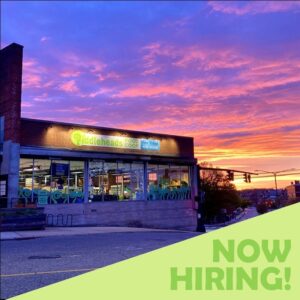 healthy, just & sustainable food system that works for everyone!
healthy, just & sustainable food system that works for everyone!
Want to develop new skills, advance your career, and do meaningful work for a business that makes a difference in your community? Come join the co-op team!
From our beginnings, co-ops have been guided by a commitment to shared values of democracy, equality, equity, and solidarity. And across our region, food co-ops have been pioneers in healthy food, sustainable agriculture, and building a more inclusive economy that works for everyone.
And working together, we are increasing our impact. Our food co-ops are locally owned by over 164,000 members, generate annual revenue of more than $382 million, and sell more than $100 million in local products. We also sustain good jobs in the community, employing 2,460 people – 65% of whom are also members, sharing in the ownership of their food co-ops.
Not only is working at your local co-op truly meaningful, it’s also fun working with others who also want to help build a better world. We’d love for you to be part of our co-op community and work to build a more healthy, just, and sustainable food system and a more inclusive economy.
Get more info and help spread the word: https://nfca.coop/co-opjobs.
Cooperative Fund of New England
The Cooperative Fund of New England (CFNE) is a non-profit community development loan fund that facilitates socially responsible investing in co-operatives, community-oriented nonprofits, and worker-owned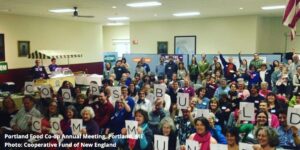 businesses in New England and adjacent communities in New York.
businesses in New England and adjacent communities in New York.
What began in 1975 by a group of idealistic young co-operative organizers, an accountant, and a couple of enlightened investors has become a highly respected community development loan fund that enjoys the support of dozens of investors and donors, both individual and institutional.
CFNE’s Mission is to work for economic, social, and racial justice by advancing community based, co-operative, and democratically owned or managed enterprises with a preference to assisting co-operatives in low-income communities by:
- Providing financial products at reasonable rates
- Developing business skills
- Offering an investment opportunity that promotes socially conscious enterprise
For more information, please visit https://cooperativefund.org.
September’s Cave to Co-op Special
Grafton Clothbound, Grafton Village Cheese, Grafton, VT
The Grafton Cave Aged line of fine cheeses takes Grafton beyond its roots in Vermont Cheddar cheese. The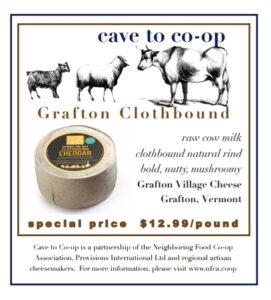 cheese is carefully matured using raw milk from small Vermont family farms that is thermalized and contains no artificial hormones. The rennet used is non GMO microbial rennet, suitable for vegetarians.
cheese is carefully matured using raw milk from small Vermont family farms that is thermalized and contains no artificial hormones. The rennet used is non GMO microbial rennet, suitable for vegetarians.
Founded in 1892 as the Grafton Co-operative Cheese Company to convert surplus milk from local dairy farmers into cheese is now the Grafton Village Cheese Company. In 1912, the cheesemaking factory burned down and the community had no cheese facility until 1962, when the Windham Foundation restored the factory and brought cheesemaking back to the community. The Foundation is dedicated to promoting the rural communities of Vermont. The profits from Grafton Village Cheese go back into the Foundation to further its commitment to keep rural Vermont alive and thriving. Today, quality and taste are still the hallmarks of the company’s products.
Each month our Cave to Co-op partnership between Provisions International and the Neighboring Food Co-op Association (NFCA) offers a delicious regional cheese featured at a great price. Strengthening our local and regional farmers and producers by supporting artisanal cheesemakers is a key goal of the Cave to Co-op program.
You can find more information, photos and recipes on our September Cave to Co-op page.
Farmers Union: Support Competition in Processing
National Farmers Union Calls on USDA to Support Competition in Meat and Poultry Processing 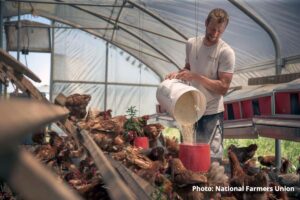
Earlier this month, National Farmers Union (NFU) submitted formal comments to the U.S. Department of Agriculture in response to a request for information on “Investments and Opportunities for Meat and Poultry Processing Infrastructure.” In the wake of the July 9, 2021 Executive Order on Promoting Competition in the American Economy, as well as the American Rescue Plan Act, USDA is redoubling its efforts to build a more diversified meat processing sector. The NFU comments note that while the Act includes directives to provide funding for a more diverse marketplace, underlying competition issues will need to be addressed through enforcement of the Packers and Stockyards Act and antitrust laws.
The comments by Rob Larew, NFU President, reiterated the need to strategically direct federal support towards enhancing resiliency and fostering competition in the meat and poultry processing sector.
“This idea has been a top priority for our members for decades,” wrote Rob Larew, NFU President, “As NFU seeks to ensure that farm families and their communities are respected, valued, and enjoy economic prosperity and social justice, we look forward to working with the U.S. Department of Agriculture (USDA) on this issue.”
“These investments are a critical component of President Biden’s Executive Order on competition and represent an important step forward in achieving a more diverse and secure food supply chain and agricultural economy,” Larew commented. “When COVID-19 brought disruptions to our livestock markets and food supply, the need for additional, diversified processing capacity became evident to policymakers and the general public.”
NFU comments detail challenges and offer specific guidance to USDA on increasing processing competitiveness, including:
- USDA must be mindful of the market environment in order to assure long-term success in diversifying the marketplace, recognizing that processing sector concentration places extreme pressure on new entrants to the meat industry.
- USDA should emphasize producer-owned co-operative business structures when offering financial assistance to the development of new processing facilities.
- USDA should stop the sale of new or expanded processing facilities to the largest processors to prevent further consolidation and should similarly prohibit the purchase of these new facilities by foreign-controlled entities. Without caution and monitoring, there could be reductions in worker safety and increases in consolidation or foreign ownership of processing capacity.
- USDA funding should include processing plant worker training, through degree programs, certifications, and other educational opportunities.
- USDA should dedicate resources to helping smaller processing facilities have access to shared services in human resources management, compliance, and training.
Full comments available here.
Our Local Farmers & Fishermen Need You!
Do you care about where your food comes from and want to support the people who produce it? Join the NEFU as a Friend of the Farmer for just $15. Your membership will help ensure that our region’s producers and consumers are heard by policy makers here at home and in Washington, DC. For more information, please visit www.newenglandfarmersunion.org.
For More Co-op Events, Visit https://nfca.coop/calendar
The Neighboring Food Co-op Association (NFCA) is a co-operative federation of over 40 food co-ops and startup initiatives across New England, working together toward a shared vision of a thriving co-operative economy, rooted in a healthy, just, and sustainable food system and a vibrant community of co-operative enterprise.


